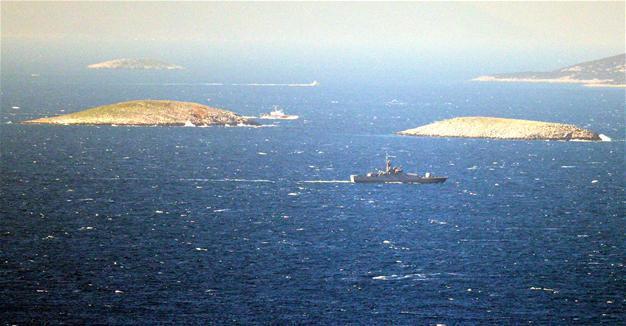Turkey doesn’t want ‘tension with Greece,’ but ‘won’t bow to fait accompli’
MURAT YETKİN
 Turkey does not want to be the one to escalate tension with Greece but also will not “bow to any fait accompli,” Defense Minister Fikri Işık told the Hürriyet Daily News on Feb. 1.
Turkey does not want to be the one to escalate tension with Greece but also will not “bow to any fait accompli,” Defense Minister Fikri Işık told the Hürriyet Daily News on Feb. 1.Işık spoke to HDN after news emerged that Panos Kammenos, the Greek defense minister, visited the air space over the Kardak islets, located about one nautical mile from Turkey’s tourism resort of Bodrum, on Feb. 1 to leave a wreath in the Aegean Sea in memory of three Greek soldiers who died in a helicopter accident during the 1996 crisis between the two countries over the sovereignty of the islets.
Kammenos’ visit came two days after Turkish Chief of Staff Gen. Hulusi Akar and his top brass visited the area near Kardak with a navy war ship on Jan. 30.
Işık said the following:
* “Greece has recently increased the frequency of its border violations. From time to time, this is due to Greek domestic politics. But that is not something good.”
* “The tension between the two countries should not escalate. Greece is our neighbor and our NATO ally. There are cooperation agreements between us.”
* “As Turkey, we don’t want to be the party to escalate the tension, but we also will not bow to any fait accompli. We have to sort out the problems through dialogue. The tension should not escalate.”
Relations between Turkey and Greece have improved in the last few years. A readmission agreement between Turkey and the European Union regarding illegal immigration, mostly involving Syrians escaping from the country’s civil war, was made possible through a protocol and cooperation between Turkey and Greece, as the Aegean Sea was one of the main transit routes for refugees. A NATO naval force has been patrolling the Aegean to halt unregistered immigration with the participation of warships from both countries.
Turkey and Greece have also been cooperating on U.N.-monitored talks for the reunification of Cyprus. Thanks to that cooperation, a five-party meeting was recently convened between the Turkish and Greek governments of Cyprus, as well as the island’s three guarantors, Turkey, Greece and the United Kingdom.
But two developments have begun to strain relations in recent weeks. The first was the refusal of Greece’s top court to extradite eight Turkish soldiers who escaped right after the foiled coup of July 15, 2016, to face trial for the attempted overthrow. The other bone of contention has been the Greek Cypriot government’s insistence on not permitting the Turkish military to have any, even symbolic, presence on Cyprus after any reunification deal.
Military sources say the increase in violations was the straw that broke the camel’s back and that Turkey wanted to “remind Greece of its presence in the Aegean” in response.
Tension between Turkey and Greece over the Kardak (Imia in Greek) islets in January 1996 escalated into a crisis that was only solved with U.S. intervention.
In his interview, Işık emphasized that Turkey favored the de-escalation of the tension through dialogue.
















